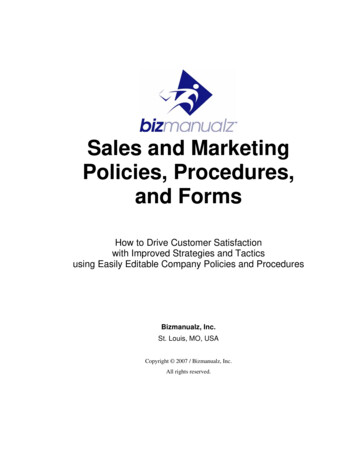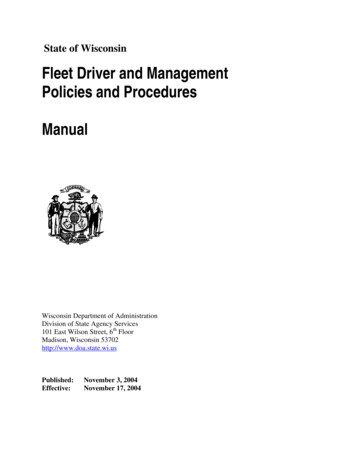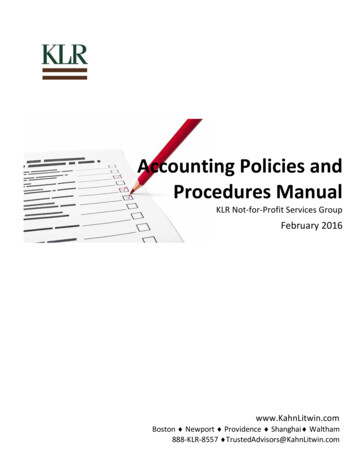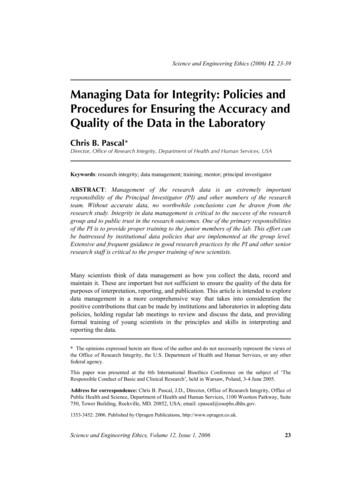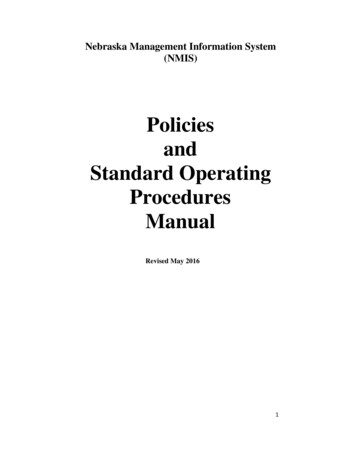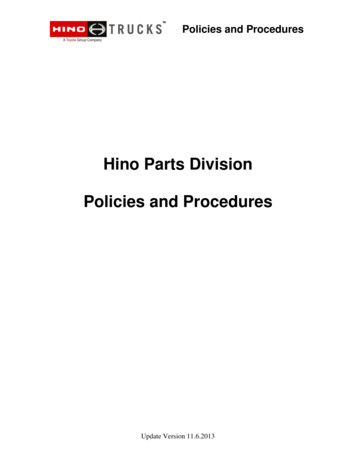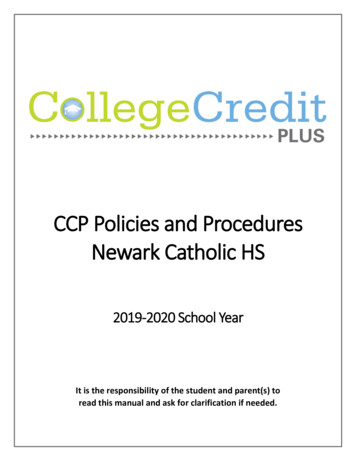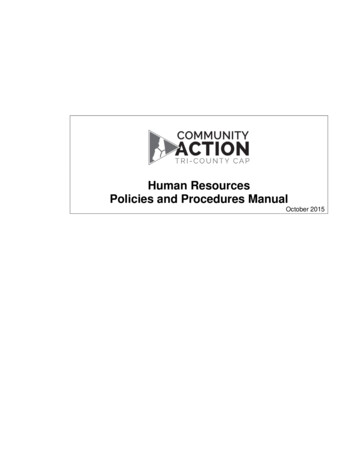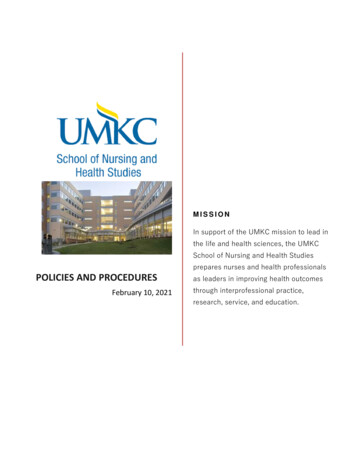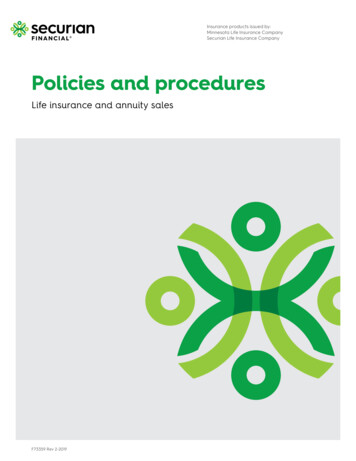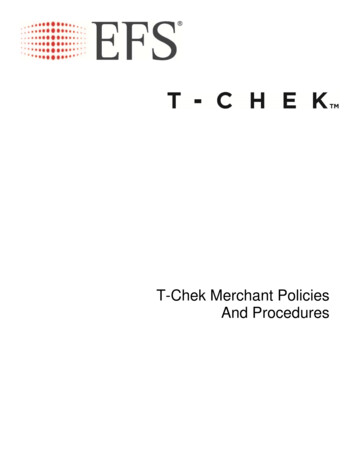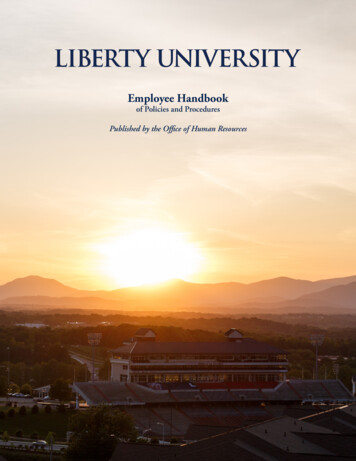
Transcription
Employee Handbookof Policies and ProceduresPublished by the Office of Human Resources
Human ResourcesGreen Hall, Room 7501971 University BlvdLynchburg, VA 24515(434) 592-7330Liberty University is accredited by the Commission on Colleges of the SouthernAssociation of Colleges and Schools (SACSCOC) to award associate, bachelor,masters, specialist and doctorate degrees. Questions about the accreditation ofLiberty University may be directed in writing to the Southern Association of Collegesand Schools Commission on Colleges at 1866 Southern Lane, Decatur, Georgia30033-4097, by calling 404-679-4500, or by using information available on SACSCOCwebsite (www.sacscoc.org).This Handbook is intended as a general guideline on employment and workplace policies and procedures thatLiberty University has put in place. It is not intended to set forth either express or implied contractual obligationsof Liberty University. Liberty University retains the right to amend, alter, or abolish any or all of these policiesas circumstances warrant with or without advance notice to employees, except as required under law.Proprietary Property of Liberty University Page 1
EMPLOYEE HANDBOOKOFPERSONNEL POLICIES AND PROCEDURESTABLE OF CONTENTSHistory of Liberty UniversityPhilosophy of EducationStatement of Mission and PurposeStatement of DoctrineSection 1: INTRODUCTION1.1 Introduction to the Employee HandbookSection 2: EMPLOYMENT POLICIES2.1 Human Resources Office2.2 Equal Employment Opportunity2.3 Americans with Disabilities Act Compliance2.4 Proof of Citizenship/Immigration Law Compliance2.5 Employment Categories/Classifications2.6 Conflicts of Interest and University Ethics2.7 Non-Disclosure, Proprietary and Confidential Information2.8 Hiring of Relatives2.9 Employment Applications2.10 Employee OrientationSection 3: STANDARDS OF PERFORMANCE3.1 Employee Conduct3.2 Quality of Work3.3 Drug and Alcohol Use3.4 Procedures for Reporting Discrimination, Harassment, and Sexual Misconduct3.5 Whistleblower3.6 Workplace Violence Prevention3.7 Professional Dress Code3.8 Outside EmploymentProprietary Property of Liberty University Page 2
Section 4: PERFORMANCE MANAGEMENT4.1 Performance Evaluation4.2 Career Advancement4.3 Grievance Policy4.4 Employment TerminationSection 5: ATTENDANCE, PAYROLL & ADMINISTRATIVE RECORDKEEPING5.1 Attendance and Punctuality5.2 Hours of Work5.3 Individual Work Schedules5.4 Timekeeping5.5 Overtime5.6 Convocation5.7 Severe Inclement Weather, Disaster, or Emergency Closings5.8 Payroll5.9 Personnel Data Changes5.10 Working in More than One Department5.11 Employment Reference Checks and Requests for Employment Verification5.12 Access to Employee Files/RecordsSection 6: LEAVES OF ABSENCE6.1 Absence from Work6.2 Vacation Benefits6.3 Holidays6.4 Personal/Sick Days Benefits6.5 Family and Medical Leave (FML)6.6 Wage Continuation6.7 Lactation Accommodation6.8 Military Leave6.9 Bereavement Leave6.10 Jury Duty and Other Civic Responsibilities6.11 Professional Days6.12 Extended Personal Leave of Absence and Leave with Approval (Lack of Work)Section 7: GENERAL OPERATING PROCEDURES7.1 Media Communications7.2 Solicitation7.3 Computer Use7.4 Weapons Policy7.5 SafetyProprietary Property of Liberty University Page 3
7.67.77.87.97.107.117.127.137.147.157.16Security InspectionsTravel and EntertainmentVehicle Safety and Approved DriversTraffic and Parking RegulationsSuicide Prevention ProcedureChild Abuse Reporting RequirementsSmokingVisitors in the WorkplaceUse of University Phones, Fax, Scanners and MailReturn of PropertyLost and FoundSection 8: BENEFITS8.1 General Information8.2 HIPAA Privacy Policy8.3 Benefits Continuation (COBRA)8.4 Workers’ Compensation Insurance8.5 Employee Assistance Program (EAP)8.6 Continuing Education8.7 Dependent Grant-In-AidProprietary Property of Liberty University Page 4
HISTORY OF LIBERTY UNIVERSITYFor more than 45 years, the late Dr. Jerry Falwell and the people of Thomas Road Baptist Churchhave had a desire to provide young people with a quality Christian education. This vision eventuallyresulted in the founding of four schools: Liberty Christian Academy (1967), Liberty University (1971),Willmington School of the Bible (1972), and Liberty Baptist Theological Seminary (1973).First known as Lynchburg Baptist College, Liberty University opened in September 1971 with 154students using the facilities of Thomas Road Baptist Church as their campus. Liberty has continuedto grow until its present enrollment is more than 14,500 residential students with over 95,000enrolled in online programs.Dr. Jerry Falwell, founder of Liberty University, also served as its Chancellor until his death on May15, 2007. Dr. A. Pierre Guillermin, the first Administrator of Lynchburg Christian Academy, served aspresident of Liberty from 1975-1997, and Dr. John Borek, Jr. served as President from 1997-2004. InMay 2004, Dr. Falwell was named Chancellor and President of Liberty University. Jerry Falwell, Jr.has served as President and Chancellor since Dr. Falwell’s death in May 2007.The Thomas Road Bible Institute was started in 1972 to allow students of any educationalbackground (from those without a high school diploma to those holding advanced degrees in otherareas) to receive biblical training for practical Christian service. Dr. Harold Willmington was the cofounder of the Institute. The Bible Institute was renamed Liberty Bible Institute, and became part ofLiberty University in 1980. It was renamed the Willmington School of the Bible in 2007.But there still remained a need for graduates of Liberty and other colleges who wanted a postgraduate theological education to prepare to serve in churches and other ministries. To meet thisneed, Liberty Baptist Theological Seminary (first known as the Lynchburg Baptist TheologicalSeminary) was established in September 1973 with an initial enrollment of 41 students. In 1985, theSeminary was merged with Liberty University and was renamed Liberty Baptist Theological Seminaryin February 2012. In 2015, Liberty Baptist Theological Seminary and the School of Religion mergedto form the School of Divinity.The property on Liberty Mountain was acquired for the University between 1972 and 2013. MarieF. Green Hall (GH), formerly the Ericsson property, was donated in 2004. The campus of LibertyUniversity is located on more than 7,000 total acres in the City of Lynchburg and neighboringAmherst, Bedford, and Campbell counties in Central Virginia. Classroom buildings, dormitories,administrative buildings and athletic facilities occupy approximately 700 acres while the remainderof the 7,000 acres is used for outdoor academic and recreational activities.In 1985, Liberty Baptist College’s name was changed to Liberty University and it was reorganized asa university. The academic departments were also restructured into 16 colleges and schools:Religion (1971) and Seminary (1973), merged to form the School of Divinity (2015), College of Artsand Sciences (1985), Business (1985), Communication & Creative Arts (1985), Education (1985), Law(2002), Helms School of Government (2004), Engineering & Computational Sciences (2007),Aeronautics (2008), College of General Studies (2011), College of Osteopathic Medicine (2012),Health Sciences (2013), Music (2013), Behavioral Sciences (2014), Nursing (2014), and the CenterProprietary Property of Liberty University Page 5
for Academic Support & Advising Services was renamed the College of Applied Studies & AcademicSuccess (2015).Founded in 1985, as the School of Lifelong Learning (LUSLL), Liberty University Online offers distancelearning programs at both the undergraduate and graduate levels. Initial programs offered were theA.A. in Religion, B.S. in Church Ministries, and the M.A. in Counseling.Liberty was first accredited as a Level II member institution by the Southern Association of Collegeand Schools Commission on Colleges (SACSCOC) in December 1980. Graduate-level courses leadingto master’s degrees were first offered by the School of Education (Master of Education) and theSchool of Religion (Master of Arts) in 1983. With the addition of these programs, Liberty (then LBC)was approved for Level III (master’s level) by SACSCOC in 1984. Level IV membership was awardedin 1987.In 1987, the Seminary offered the University’s first doctoral degree, the Doctor of Ministry, whichresulted in SACSCOC awarding Liberty University Level V membership in 1993. The School ofEducation first offered courses leading to the Doctor of Education (Ed.D.) in Fall 1999, followed bythe College of Arts and Sciences offering the University’s first Ph.D. program in Counseling in Fall2002. The Seminary implemented the Ph.D. in Theology and Apologetics in Fall 2008. The additionof this last degree increased the number of doctoral degrees offered by Liberty to four, allowingLiberty to be reclassified as a Level VI institution — the highest SACSCOC membership classification.With the completion of its fourth reaffirmation in 2006, the University is currently accreditedthrough 2016, when the next on-site accreditation review is required.Liberty University School of Law began offering first year classes leading to the Juris Doctor (J.D.)degree in August 2004. On August 5, 2010, the School of Law was awarded full accreditation by theAmerican Bar Association Council of the Section of Legal Education and Admissions to the Bar.* TheCollege of Osteopathic Medicine received provisional accreditation from the American OsteopathicAssociation Commission on Osteopathic College Accreditation on May 24, 2013; classes leading tothe Doctor of Osteopathic Medicine (D.O.) degree began in Fall 2014.*American Bar Association, 321 N. Clark Street, Chicago, Illinois 60654-7598, 312-988-5000Proprietary Property of Liberty University Page 6
PHILOSOPHY OF EDUCATIONLiberty University is a Christian academic community in the tradition of evangelical institutions ofhigher education. As such, Liberty continues the philosophy of education which first gave rise to theUniversity and which is summarized in the following propositions. God, the infinite source of all things, has shown us truth through Scripture, nature, history,and above all, Christ.Persons are spiritual, rational, moral, social, and physical, created in the image of God. Theyare, therefore, able to know and to value themselves and other persons, the universe, andGod.Education as the process of teaching and learning, involves the whole person, by developingthe knowledge, values, and skills which enable each individual to change freely. Thus itoccurs most effectively when both instructor and student are properly related to God andeach other through Christ.Proprietary Property of Liberty University Page 7
STATEMENT OF MISSION AND PURPOSEMaintaining the vision of its founder, Dr. Jerry Falwell, Liberty University develops Christ-centeredmen and women with the values, knowledge, and skills essential to impact the world.Through its residential and online programs, services, facilities, and collaborations, the Universityeducates men and women who will make important contributions to their workplaces andcommunities, follow their chosen vocations as callings to glorify God, and fulfill the GreatCommission.Liberty University will:1. Emphasize excellence in teaching and learning.2. Foster university-level competencies in communication, critical thinking, informationliteracy, and mathematics in all undergraduate programs.3. Ensure competency in scholarship, research, and professional communication in all graduateprograms and undergraduate programs where appropriate.4. Promote the synthesis of academic knowledge and Christian worldview in order that theremight be a maturing of spiritual, intellectual, social and physical value-driven behavior.5. Enable students to engage in a major field of study in career-focused disciplines built on asolid foundation in the liberal arts.6. Promote an understanding of the Western tradition and the diverse elements of Americancultural history, especially the importance of the individual in maintaining democratic andfree market processes.7. Contribute to a knowledge and understanding of other cultures and of international events.8. Encourage a commitment to the Christian life, one of personal integrity, sensitivity to theneeds of others, social responsibility and active communication of the Christian faith, and,as it is lived out, a life that leads people to Jesus Christ as the Lord of the universe and theirown personal Savior.Approved by the Liberty University Board of Trustees, March 7, 2014Proprietary Property of Liberty University Page 8
STATEMENT OF DOCTRINEWe affirm our belief in one God, infinite Spirit, creator, and sustainer of all things, who existseternally in three persons, God the Father, God the Son, and God the Holy Spirit. These three areone in essence but distinct in person and function.We affirm that the Father is the first person of the Trinity and the source of all that God is and does.From Him the Son is eternally generated and from Them the Spirit eternally proceeds. He is thedesigner of creation, the speaker of revelation, the author of redemption, and the sovereign ofhistory.We affirm that the Lord Jesus Christ is the second person of the Trinity. Eternally begotten from theFather, He is God. He was conceived by the virgin Mary through a miracle of the Holy Spirit. He livesforever as perfect God and perfect man: two distinct natures inseparably united in one person.We affirm that the Holy Spirit is the third person of the Trinity, proceeding from the Father and theSon and equal in deity. He is the giver of all life, active in the creating and ordering of the universe;He is the agent of inspiration and the new birth; He restrains sin and Satan; and He indwells andsanctifies all believers.We affirm that all things were created by God. Angels were created as ministering agents, thoughsome, under the leadership of Satan, fell from their sinless state to become agents of evil. Theuniverse was created in six historical days and is continuously sustained by God; thus it both reflectsHis glory and reveals His truth. Human beings were directly created, not evolved, in the very imageof God, as either biologically male or female from the womb. As reasoning moral agents, they areresponsible under God for understanding and governing themselves and the world.We affirm that the Bible, both Old and New Testaments, though written by men, was supernaturallyinspired by God so that all its words are the written true revelation of God; it is therefore inerrantin the originals and authoritative in all matters. It is to be understood by all through the illuminationof the Holy Spirit, its meaning determined by the historical, grammatical, and literary use of theauthor’s language, comparing Scripture with Scripture.We affirm that Adam, the first man, willfully disobeyed God, bringing sin and death into the world.As a result, all persons are sinners from conception, which is evidenced in their willful acts of sin;and they are therefore subject to eternal punishment, under the just condemnation of a holy God.We affirm that Jesus Christ offered Himself as a sacrifice by the appointment of the Father. Hefulfilled the demands of God by His obedient life, died on the cross in full substitution and paymentfor the sins of all people, was buried, and on the third day He arose physically and bodily from thedead. He ascended into heaven where He now intercedes for all believers.We affirm that each person can be saved only through the work of Jesus Christ, through repentanceof sin and by faith alone in Him as Savior. The believer is declared righteous, born again by the HolySpirit, turned from sin, and assured of heaven.Proprietary Property of Liberty University Page 9
We affirm that the Holy Spirit indwells all who are born again, conforming them to the likeness ofJesus Christ. This is a process completed only in Heaven. Every believer is responsible to live inobedience to the Word of God in separation from sin. Doing so produces a distinctly Christianlifestyle of practicing virtues and avoiding sin. Among other virtues, followers of Jesus Christ will:show evidence of the Holy Spirit living within them such as love, joy, peace, patience, kindness,goodness, faithfulness, gentleness and self-control; put on compassion, kindness, humility,gentleness, patience, forgiveness and supremely, love; seek righteousness, mercy and justice,particularly for the helpless and oppressed; love and side with what is good in God’s eyes and abhorwhat is evil in God’s eyes; uphold the God-given worth of all human beings, from conception todeath, as the unique image-bearers of God; treat all people impartially, seeing them as equals beforeGod and worthy of salvation; pursue unity and embrace people of all tribes and tongues as part ofGod’s design for humanity; uphold chastity among the unmarried and the sanctity of marriagebetween one natural-born man and one natural-born woman; be people of integrity whose wordcan be fully trusted; give faithful witness to the Gospel; practice good works toward all; and live livesof prayer and thanksgiving. Sinful acts are prohibited by God and include but are not limited to:worship of idols or gods other than the Lord God of the Bible; denying Jesus Christ as eternal, asGod’s son in flesh, as resurrected, as Creator, as Lord or as Messiah who died for the sins of allpeople; rejection of Jesus Christ or rebellion against God; blasphemy; participation in devil worship,practice of the occult, astrology, fortune-telling, sorcery, or witchcraft; taking of innocent life; denialof birth sex by self-identification with a different gender; married persons sexually or romanticallycoupling with a person other than their spouse; sexual relations outside of marriage between onenatural-born man and one natural-born woman; romantic coupling among persons of the same sex;prostitution; orgies; rape; drunkenness; use of profanity and vulgarity; injustice; making falsestatements; dishonest sales and exchanges of money; thievery; fits of rage; and illegal activity.We affirm that God ordained three institutions with unique purposes in society: marriage,government and the church. God established marriage as a covenantal bond between a naturalborn man and a natural-born woman to populate the earth, to raise and spiritually train childrenwithin a family, to provide the couple with intimate companionship, loving help and joy, and to serveas an illustration of the relationship of Jesus Christ to the church. God established civil governmentto protect its citizens, punish evil and reward good. God established the church as the entire bodyof believers with Jesus Christ as the cornerstone and the apostles as its foundation to evangelize,baptize and disciple people of all nations.We affirm that a church is a local assembly of baptized believers, under the discipline of the Wordof God and the lordship of Christ, organized to carry out the commission to evangelize, to teach, andto administer the ordinances of believer’s baptism and the Lord’s table. Its offices are pastors anddeacons, and it is self-governing. It functions through the ministry of gifts given by the Holy Spirit toeach believer.We affirm that the return of Christ for all believers is imminent. It will be followed by seven years ofgreat tribulation, and then the coming of Christ to establish His earthly kingdom for a thousandyears. The unsaved will then be raised and judged according to their works and separated foreverfrom God in hell. The saved, having been raised, will live forever in heaven in fellowship with God.Proprietary Property of Liberty University Page 10
Section 1: INTRODUCTION1.1INTRODUCTION TO THE EMPLOYEE HANDBOOKThis Handbook is intended as a general guideline on employment and workplace policies andprocedures that Liberty University has put in place. It is not intende
Willmington School of the Bible (1972), and Liberty Baptist Theological Seminary (1973). First known as Lynchburg Baptist Col
